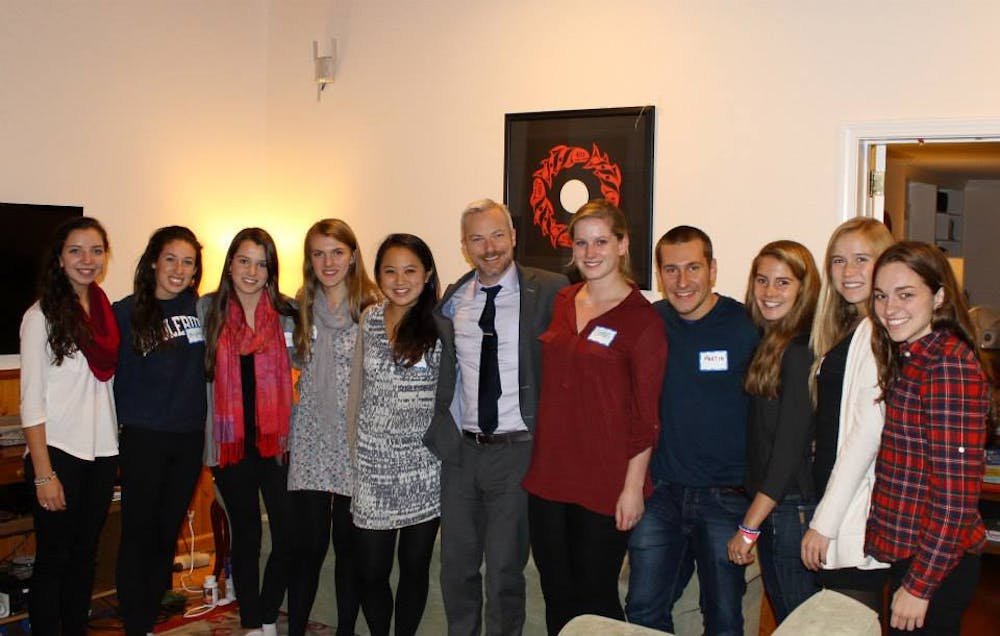Instead of the typical pictures of physical distortion and emaciated children one would expect to encounter in any other talk about social issues, E. Benjamin Skinner began his lecture on modern-day slavery with light-hearted banter with the full audience in Dana Auditorium on Thursday, Nov. 7. Skinner was the keynote speaker of the student organization Stop Traffick’s fall Symposium, “Humans: Not for Sale.”
Award-winning author and journalist, recently named National Geographic Adventurer of the Year, Skinner gave a ‘narrow’ definition of slavery — the state in which one is forced to work with no pay and beyond subsistence. He then pointed out some of the false assumptions associated with this definition.
Modern slavery is more than a form of poverty — it is a mental construct. Skinner recounted several experiences investigating modern slavery, showing that the root of the problem lies in the dependence of slaves on their masters.
Ganu, an enslaved quarry worker whom Skinner interviewed, was at a loss when Skinner asked him why he didn’t escape. “Where would I go, and how would I eat?” Ganu asked Skinner. “Wherever I go, Ramesh (the mafia head that enslaved him) would find me.”
Ramesh is both “a taker of life and a giver of sustenance,” said Skinner.
And yet, Skinner offers hope for the enslaved. He was the hero of the liquidation of a New Zealand fishery that enslaved Eustrol — another man he met on his investigation journey. Right now, Eustrol works with a California DNA tracking firm finding illicit timber, while the CEO of the fishery is structurally unemployed.
Although gaining moral leverage against a corporation would invariably lead to a positive response, a solution is yet to be found for slavery in less networked exchanges, such as in the sex trade.
But Skinner continues to believe in the power of the media. As long as someone “shines a torch” on these atrocities, there is still hope.
But when a student asked him whether journalism is a good way to go about eradicating slavery, he jokingly answered, “No, don’t do investigative journalism unless you want your parents to take out six mortgages to support you.”
“We need engineers, doctors, architects,” Skinner added. “Whatever your calling is, our line of work needs your skills.”
While Skinner’s talk was certainly a powerful one, students feel there is very little they can actually do to ameliorate such a global and complex issue, or even relate to it.
Rafael Manyari ’15, a supporter of Stop Traffick, thinks that the symposium, being the “tip of the iceberg” of the problem, seemed to exert a limited effect on the Middlebury community.
“I haven’t really heard people talking about the talk since it happened,” he said.
Interim president of Stop Trafficking, Denise Chan ’16, agreed with Manyari’s assessment.
“As a Middlebury student I can’t actually go stop trafficking,” she said. “However, awareness is the first step to attacking the heart of the problem. It is important for people to be aware of this problem in order for them to really understand it and really care about it.”
While Middlebury students cannot actually rescue beleaguered women from their brothels, their “focused energy” and “commitment to raising awareness of these issues here on campus” has indeed “led to important events,” as Associate Professor of Education & Wonnacott Commons Head Jonathan Miller Lane concluded.
Indeed, according to Chan, the overwhelming attendance of the symposium was the “breakout moment” for their committee.
“I’m just so happy that it turned out so successfully,” she said.
However, while Professor Miller-Lane recognized the importance of awareness, he believes it insufficient.
“Outrage is necessary, but insufficient,” he said. “The levers of power mattered. Who has it and who does not? How is power exercised? Where are the pressure points that could be leveraged to change conditions for those who are most victimized?”
Adrian Leong ’16 — a social activist known for his work on Divestment — didn’t agree with Skinner’s means of leveraging of power in journalism.
“[Skinner] told us if we knew more about their supply chain [of trafficking] than they do, then they will listen to you,” he said. “Well, then maybe you shouldn’t help them at all, because now they will start thinking about the supply chain! Isn’t that in itself deeply troubling and problematic?”
“I also didn’t quite like the bit where he was celebrating his case study example’s new life,” Leong added. “I think it is too early to claim victory. Sounded too much like hubris to me.”
Perhaps it’s not about the leverage of power, but about breaking out of the mentality of slavery. Manyari recognizes an irony in the situation.
“Even though many slaves are serving the firms from the western world, most solutions to human trafficking come from them too,” he said. “It’s the locals who actually enslave from the local area … so it is important to consider the perspective of the locals.”
Not only is it important to be aware, but it is also important to disseminate awareness to those affected by understanding their particular circumstances.
As Chan said, “Joining an organization that deals with particular aspects of human trafficking, such as rehabilitation of victims, is definitely a way of providing tangible help.”
Stop Traffick: Slavery is Not a Thing of the Past

Comments


